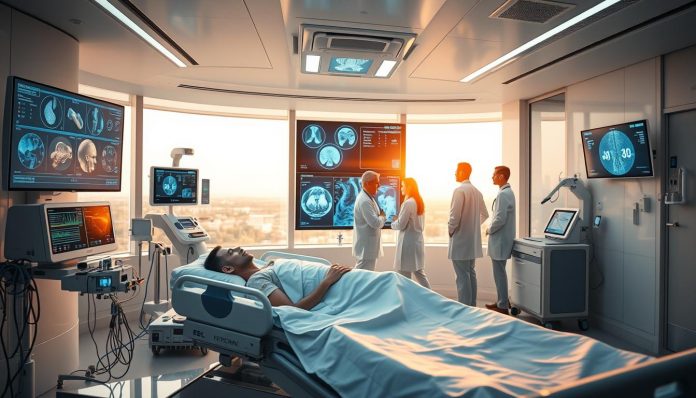Healthcare technology is changing the patient experience in a profound way. Digital health solutions are transforming the care delivery process, starting with diagnosis, through to discharge.
By 2025, healthcare is likely to see major improvement in medical innovation, which will improve patient experience. Technology is making things easier, diagnosing more accurately, and treating each patient more personally.
Key Takeaways:
- Digital health is changing the patient experience.
- Diagnosis is becoming more accurate with healthcare technology.
- Individualized therapy is on the rise.
- Innovation in medicine is improving the care of patients.
- Technology is so crucial to the future of healthcare.
The Future of Healthcare and Technology: The Future of Convergence:
With 2025 in sight, the integration of healthcare and technology is changing patient care. It is not only about acquiring new tools, but a rethinking of the entire healthcare ecosystem in order to make it more patient-centric, more efficient, and more effective.
The Digital Revolution of Patient Care:
The digital revolution is transforming patient care in a more personalized and proactive way. In the case of telemedicine, healthcare services have become more accessible to the patients, who now can be treated at the comfort of their homes. This transition is not only increasing patient satisfaction, but also improving health outcomes.
An important feature of such transformation is the employment of data analytics to guide care decisions. Using data, healthcare providers will be able to detect trends, anticipate patient needs, and work on interventions related to patient needs.
Innovative Technological Landmarks Changing the Face of Healthcare.
A number of technological breakthroughs are changing this:
- Artificial Intelligence (AI): AI is being implemented to process complex medical information, help with diagnosis, and tailor treatment.
- Internet of Medical Things (IoMT): IoMT technologies are improving patient care and real-time intervention.
- Blockchain: Blockchain technology is enhancing interoperability and security of data.
| Technological Milestone | Impact on Healthcare |
| Artificial Intelligence | Enhanced diagnostic accuracy and personalized medicine |
| Internet of Medical Things | Real-time patient monitoring and proactive care |
| Blockchain | Secure and interoperable health data exchange |
According to one healthcare professional, the future of healthcare is the ability to utilize technology to provide a more patient-centered experience. In 2025, this vision will come to life, and technology will significantly transform healthcare provision.
The Contemporary Patient Experience: P-E-P:
The healthcare environment is in the midst of a major change, turning the patient experience into a proactive one. This trend is attributable to the incorporation of technology in the provision of patient care, thus, developing a more patient-centered model.
The core to this change is the patient-centered digital ecosystems. These ecosystems will combine different digital resources and platforms to introduce holistic care. They empower health care professionals to retrieve patient information, monitor patient paths, and provide customized interventions. Healthcare providers can use these ecosystems to make the patient experience more responsive and individualized.

Digital Ecosystems in a patient-centered manner:
Digital ecosystems designed with patients in mind are transforming the care delivery process. These ecosystems allow more integrated and coordinated patient care, by linking various stakeholders and services via digital solutions. This encompasses the ability to access health records, schedule appointments, and customized treatment plans with security.
Digital Engagement Tools and Health Literacy:
Improving health literacy by using digital engagement tools is another important factor in empowering patients. These tools consist of patient portals, mobile apps, and telehealth, which allow patients to readily access their health data and become active participants in their care. Through health literacy, patients can become better prepared to control their health and make informed decisions.
Online communication tools also simplify the interaction between patients and medical professionals to ensure that patients get adequate support and instructions in time. This improves the patient experience and also leads to improved health outcomes.
Pre-Diagnosis: Intelligent Symptom Checker and Prevention:
The pre-diagnosis phase is becoming more accurate with AI-enabled technologies. Introduction of AI in the evaluation of symptoms is improving the accuracy of the primary diagnosis greatly, and timely interventions become possible.
Summary: The Future and Ethics of Patient Care:
With the ever-growing advancement of healthcare technology, ethical considerations around information privacy, AI discrimination, and fair access to care should be considered. The future of patient care relies on technological innovation vs. patient-centered care. We can capitalize on the potential by ensuring that we are transparent, accountable and inclusive of healthcare technology to enhance the patient experience and to improve health outcomes.
The integration of healthcare technology:
It has made a change in the patient experience, both at diagnosis and discharge, and more. It is important to note that as we proceed it is essential that the needs and values of the patients, caregivers and healthcare providers are aligned to technological advancements.
This way, we will be able to develop a caring, efficient, and sustainable healthcare system that puts priorities first patient-centered care and enhances positive health outcomes.
FAQ:
How can AI be used in the patient journey?
To enhance patient outcomes and simplify the healthcare process, AI is being actively utilized on different patient journey stages, such as diagnosis, treatment planning, or recovery monitoring.
What is technology doing to empower patients under its care?
Patients are now gaining power through technology that allows them to access their health data, empowering them to be a more active participant in their health care via patient-centered digital ecosystems and health literacy tools.
What is the value of smart wearables and round-the-clock health tracking?
Wearables and constant health monitoring allows detecting health problems early, preventive treatment, and timely treatment, and ultimately leads to a better patient outcome and lowers healthcare expenditures.
What is the revolution in diagnoses with precision medicine?
By applying genomic sequences and AI-assisted diagnostic algorithms, precision medicine is facilitating more accurate and personalized diagnoses, resulting in targeted treatment and improved patient outcomes.
How does digital technology affect treatment planning?
Digital technologies, including multidisciplinary digital tumor boards and accessible care portals of patients, are bolstering partnership and involvement of patients in treatment planning, resulting into more efficient and personalized care.
What are smart hospitals and connected care doing to improve patient care?
By deploying IoT-enabled patient rooms, robotic surgery, and 5G integrating telehealth, smart hospitals and connected care are making the care experience more seamless and efficient, leading to better patient outcomes and satisfaction.
Where does predictive analytics play in discharge planning?
Using AI-driven readmission risk assessment, predictive analytics can be used to identify patients who are likely to readmit, allowing targeted interventions and minimizing hospital readmissions.
What effect is technology having on post-discharge care?
Home-based recovery technologies, virtual rehabilitation programs and hospital-at-home programs are some of the ways in which technology is expanding the notion of the virtual hospital, allowing greater flexibility and patient-centered post-discharge care.
What are the ethics of using technology in healthcare?
Ethical issues associated with technology in healthcare encompass data privacy, equity of access, transparency and patient-centered care, which need to be well-weighed in order to make a positive contribution to patients and healthcare systems.


